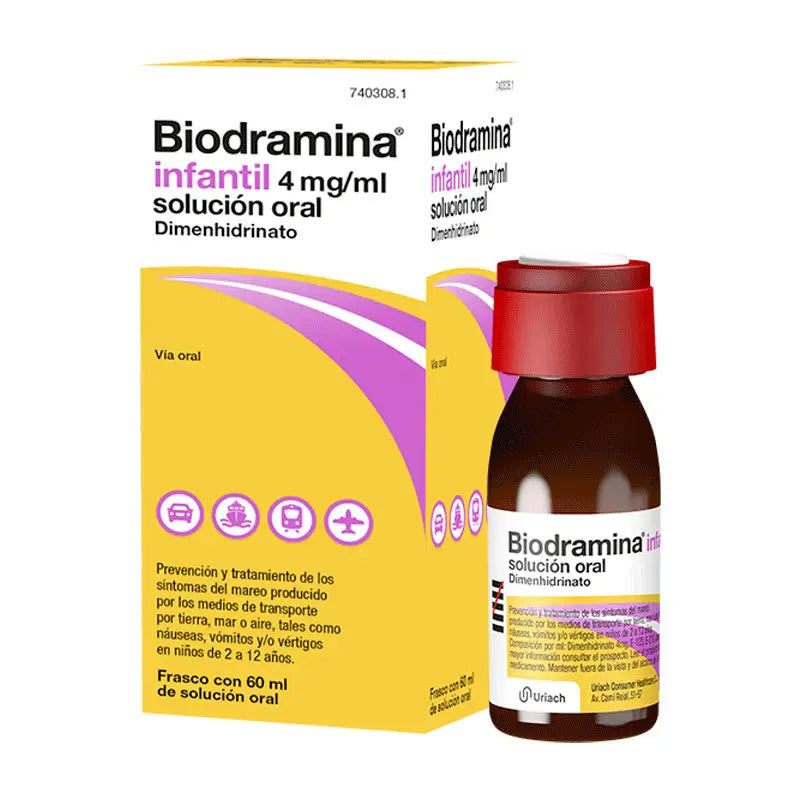Oral solution formulated with dimenhydrinate, an active ingredient against motion sickness. For paediatric use.
Contains 60 g.

Dimenhydrinate is the active substance in this medicine and acts against motion sickness. It is indicated for the prevention and treatment of symptoms of motion sickness caused by land, sea or air travel, such as nausea, vomiting and/or dizziness in children aged 2 to 12 years.
Suitable for use inchildren aged 2 to 12 years.
Recommended doses vary according to the patient:
It is recommended to take the first dose at least half an hour before the start of the journey (preferably 1-2 hours before), and if you have not taken it beforehand, the first dose should be taken when the symptoms appear. If dizziness persists, at least 6 hours should elapse between one dose and the next.
It is recommended to take this medicine with food, water or milk to minimise gastric irritation.
Before taking this medicine, read the following instructions carefully:
1. Open the bottle according to the instructions on the safety cap. Squeeze on the surface of the bottle and at the same time unscrew it anticlockwise.
2. Insert the dosing syringe, pressing it into the hole in the perforated stopper (seefigure 1).
3. Invert the bottle and withdraw the dose indicated on the package leaflet (seefigure 2 ) .
4. Administer directly with the dosing syringe or place the contents of the dosing syringe on a teaspoon.
5. the dosing syringe should be washed after each feeding and can be sterilised, if necessary, by boiling it in water or by immersing it in the sterilising solution used for feeding bottles.
|
Figure 1 |
Figure 2 |
Do not use Biodramina Infant Oral Solution:
Like all medicines, Biodramina Infantil oral solution may cause side effects, although not everybody will suffer from them. In this case, side effects are usually mild and transient, especially at the beginning of treatment.
The following adverse reactions have been observed during the period of use of dimenhydrinate, the frequency of which cannot be established with certainty:
If you suffer from asthma, severe respiratory diseases (chronic obstructive pulmonary disease, emphysema, chronic bronchitis), as thickening of secretions and altered expectoration may occur.
If you suffer from a disease in which there is an abnormal increase in the activity of the thyroid gland (hyperthyroidism), increased intraocular pressure (glaucoma), an enlarged prostate (prostatic hypertrophy), hypertension or a disease causing obstruction of the urinary tract or gastrointestinal tract.
If you suffer from seizures in which convulsive movements occur, with or without loss of consciousness (epilepsy).
If you are over 65 years of age, dry mouth, urine retention, nausea, sedation, confusion and low blood pressure (hypotension) may occur.
If you are using a medicine that causes ear toxicity, as symptoms of these toxic effects, such as ringing in the ears, dizziness or lightheadedness, may be masked.
If you have liver or kidney disease or disorder, stomach or duodenal ulcer, or inflammation of the stomach (gastritis) you should consult your doctor before taking this medicine.
You should consult your doctor before taking this medicine if you have or have ever had heart disease or disorders (cardiac arrhythmia, myocardialischaemia ,...).
If you suspect that you may have symptoms of appendicitis such as nausea, vomiting or abdominal cramps, it is recommended that you see a doctor so that the presence or absence of appendicitis can be ruled out, as dimenhydrinate may make it more difficult to diagnose this disease.
It is recommended to avoid exposure to very high temperatures and to follow appropriate hygienic-dietary measures, such as adequate aeration and hydration.
Avoid exposure to sunlight (even when it is cloudy), and ultraviolet lamps (U.V.A. rays) while taking this medicine.
The active substance isdimehydrinate. Each ml of Biodramina Infantil oral solution contains 4 mg dimenhydrinate. The other ingredients (excipients) are: propylene glycol (E 1520), methylparahydroxybenzoate (E218), sucrose, strawberry essence (contains benzyl alcohol), amaranth (E 123), saccharin sodium (E 954) and purified water.
If you have taken more Biodramina Infantil than you should, consult your doctor or pharmacist immediately.
Symptoms of overdose mainly include: dilated pupils, flushed face, excitement, hallucinations, confusion, irritation of the stomach and intestine with nausea, vomiting and diarrhoea, disturbance of the stomach and intestine with nausea, vomiting, vomiting and diarrhoea, vomiting and diarrhoea.mites and diarrhoea, movement disturbances, convulsions, profound loss of consciousness (coma), sudden decrease in respiratory and heart function (cardiorespiratory collapse) and death. Symptoms may take more than 2 hours after overdose to appear.
The price of non-prescription medicines is set by law. However, at Farmaciasdirect you can buy Biodramina Infantil Oral Solution at a discount of 10%, which is the maximum legally allowed.
